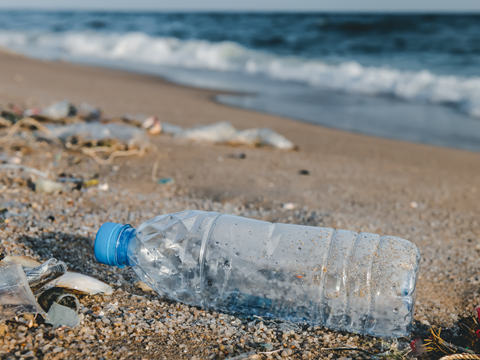
The Food Standards Agency (FSA) and Food Standards Scotland (FSS) urge businesses to avoid using plastics recovered from open environments, including ‘ocean-bound’ plastics, in food-contact packaging, citing insufficient evidence to guarantee their safety.
After reviewing the Joint Expert Group for Food Contact Materials (FCMJEG)’s assessment concerning the safety of ocean-bound plastics in meat, poultry, and fish packaging sold in supermarkets, among other food-contact materials, the FSA and FSS say there is not enough evidence to prove that the recovered plastics have no human health implications.
No authorized processes currently exist to enforce specific restrictions via existing legislation or within individual authorizations, the FSA explains; this is because current regulation already requires plastic recycling processes, including their input materials, to be assessed for decontamination efficiency.
However, since the FCMJEG could not rule out a safety risk when packaging edible products in recovered plastic packaging, the FSA and FSS warn businesses not to use mechanically recycled plastics sourced from open environments – whether on land, in waterways, or at sea, as well as from areas with underdeveloped waste management infrastructure – in their food-contact products.
Instead, they recommend recycled plastic from kerbside collection and other controlled environments, which is considered safe – or, alternatively, manufacturers should find non-contact methods of repurposing recovered plastics.
“We acknowledge the benefits of recycling abandoned plastic that has been collected from the open environment, especially plastic in danger of entering waterways or oceans,” explains Dr James Cooper, deputy director of Food Policy at the FSA. “Such initiatives, if carried out appropriately, can protect the environment while supporting innovation and economic growth.
“However, our role is to ensure food is safe, and we have concerns over the safety of these plastics, which we term abandoned environmental plastic, when used in their recycled form for products such as ready meal containers, fresh food trays and bottles.
“Abandoned environmental plastic is a small percentage of the recycled plastic market. The majority comprises kerbside recycled plastics, which are still viable for food contact material.
“Plastic materials collected from established and controlled environments such as UK kerbside collection systems have undergone substantial work in the past to ensure that they adhere to current safety standards.
“Unfortunately, we are currently not confident that the collection of abandoned environmental plastic, which is subsequently mechanically recycled, is meeting the same standards. In light of this, we are advising businesses not to use this type of plastic in food packaging and to look for alternative uses for it.”
Helen Bird, head of Materials Systems Transformation at the Waste & Resources Action Programme (WRAP), adds: “Recycling plastics into food-grade packaging is done with utmost care using material collected from kerbside only to ensure that the plastic derives from food packaging, for food safety reasons. There are many products which can and are successfully made using ocean bound plastic, including non-food packaging, and we welcome this clarification from the FSA.
“Plastic pollution is an environmental disaster. We must eliminate problematic and unnecessary single-use plastic and recycle plastic back into appropriate products and packaging, where possible.
“Most supermarkets and the food brands they sell are members of The UK Plastics Pact and committed to this end. Through their actions, 33 billion plastic items have already been removed from shelves. But more needs to be done to deal with the legacy plastic pollution.”
In a previous edition of the Brief, we explored on the six responses to the FSA’s call for evidence from stakeholders. The FSA reported that Sainsbury’s intended to recycle ‘ocean-bound’ plastics into its fish and berry packaging in line with its efforts to halve its plastic packaging by 2025 and achieve net zero by 2040.
Bantam Materials outlined its collection, sorting, and shipping processes; it also provided detail and documentation surrounding its regulatory compliance, material specifications, analytical testing results, and plastic traceability.
Similarly, Sharpak offered information about its manufacturing sites, analytical results, and plastic traceability – claiming that it could fully certify that its packaging materials adhered to the EU and EFSA’s food-contact safety standards.
Yet Faerch emphasized that it was not using ‘ocean-bound’ plastics in its products, since it had not been assured that such materials were safe to use. Nevertheless, it emphasized its ‘full support’ for collecting and recycling plastic for non-food applications.
The Brief also covered the arguments for and against ‘ocean-bound’ plastics in packaging, ranging from the benefits of keeping plastic waste out of the ocean to fears expressed by critics that the recyclate could contain toxic substances and additives.
The FSA’s advice comes after the European Commission announced that it had officially banned Bisphenol A (BPA) in food-contact materials due to health concerns. While it was already forbidden in food-contact materials aimed at young children, such as baby bottles, the new rule now applies to all products in direct contact with food and drink, with ‘very limited’ exceptions where no alternatives exist.
If you liked this story, you might also enjoy:
Reuse vs. single use – which is better for the environment?
Sustainable Innovation Report 2025: Current trends and future priorities
What can the world learn from South Korea’s world-leading performance in plastics circularity?














No comments yet